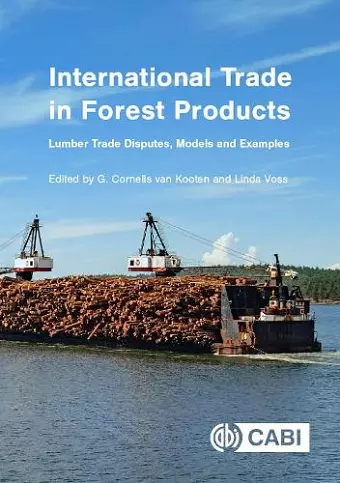International Trade in Forest Products
Lumber Trade Disputes, Models and Examples
Linda Voss editor Professor G Cornelis van Kooten editor
Format:Hardback
Publisher:CABI Publishing
Published:18th Dec '20
Should be back in stock very soon

Professional forest economists working as researchers and/or policy advisors in government departments with responsibility for private or public forest lands or at an international agency, such as the Food and Agricultural Organization (FAO) of the United Nations, and consultants at private firms that provide advice to clients on issues related to wood products. It will also appeal to academic researchers interested in forest trade modelling or conducting research in other sectors where the consequences of trade policies need to be considered, and to instructors of courses that focus on international trade or forest economics
This book provides the background theory behind two types of trade models rooted in economic theory and mathematical programming, and two econometric/statistical models. It shows the reader how to construct their own models to analyse policy questions in forestry and other sectors.Because of the long-standing Canada-U.S. lumber trade dispute and the current pressure on the world's forests as a renewable energy source, much attention has been directed toward the modelling of international trade in wood products. Two types of trade models are described in this book: one is rooted in economic theory and mathematical programming, and the other consists of two econometric/statistical models--a gravity model rooted in theory and an approach known as GVAR that relies on time series analyses. The purpose of the book is to provide the background theory behind models and facilitate readers in easily constructing their own models to analyse policy questions that they wish to address, whether in forestry or some other sector. Examples in the book are meant to illustrate how models can be used to say something about a variety of issues, including identification of the gains and losses to various players in the North American softwood lumber business, and the potential for redirecting sales of lumber to countries outside the United States. The discussion is expanded to include other products besides lumber, and used to examine, for example, the effects of log export restrictions by one nation on all other forestry jurisdictions, the impacts of climate policies as they relate to the global forest sector, and the impact of oil prices on forest product markets throughout the world. This book will appeal to practising economists and researchers who wish to examine various policies that affect international trade, whether their interest is local or international in scope. Because the book provides the theoretical bases underlying various models, students and practitioners will find this a valuable reference book or supplementary textbook.
ISBN: 9781789248234
Dimensions: 244mm x 172mm x 17mm
Weight: 721g
216 pages